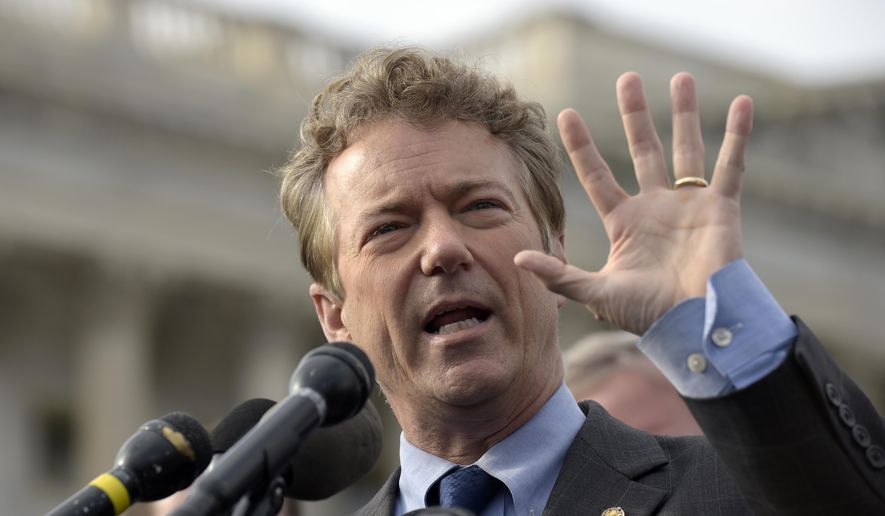FRANKFORT, Ky. (AP) - Duard Rutledge voted for Donald Trump and Rand Paul for the same reason: They’re not afraid of a fight.
That’s why the 66-year-old retired Toyota worker wasn’t worried to see Kentucky’s junior senator getting in the way of the Republican plan to replace Obama’s health care law.
“When you get two thoroughbreds, they are high strung,” he said. “But if you get them headed the right way they can both win the race.”
Paul has been one of the most vocal Senate critics of the GOP plan to replace the federal Affordable Care Act, even before he knew what was in it. Last week, he hauled a copy machine outside of the room where House Republicans were writing the bill and asked for a copy, highlighting the secrecy surrounding the proposal. Since then, he has declared the plan dead, calling it “Obamacare lite.”
Trump has pushed back, but without the blunt-force approach that has defined his politics. He dispatched top aide Kellyanne Conway to appear via phone on a Louisville radio station to express disappointment with Paul’s comments. And while Trump has used his Twitter account to call Paul a “spoiled brat” in the past, he used his powerful social media presence this week to call Paul “my friend” and said he was sure he would “come along with the new and great health care program.”
Paul won another six-year term last year and White House pressure is unlikely to make him reverse course.
On Saturday, Vice President Mike Pence is scheduled to appear in Louisville, possibly to advocate publicly for the replacement plan. For Terry Wright, a retired union worker in Louisville who voted for Trump, that’s all he needs to hear.
“I trust him (Trump) more than I would trust anybody else,” he said, adding he did not vote for Paul in the U.S. Senate election.
Pence is scheduled to appear with Republican Gov. Matt Bevin, who told reporters on Friday that he will tell Pence “we support their effort to fix this problem” while adding he is not a fan of the initial proposal.
“Sen. Paul … is not impressed with what has currently been offered. Truth be told, I’m not either. So I’m with him,” Bevin said.
After years of Democratic dominance, Kentucky voters are becoming accustomed to Republican rule and the infighting that can come with it. Whether it’s U.S. Sen. Mitch McConnell and Bevin - two fierce primary foes turned allies after Bevin won the 2015 governor’s race - or Trump and Paul’s vicious barbs during the GOP presidential primaries, many conservative voters see conflict as a healthy part of politics.
“Whenever we get into this kinder, gentler, ’Well I’m not going to say that because it will make them mad,’ that’s how we get in trouble,” said Alan Halsey, a 31-year-old publisher of The Swift Creek Courier and owner of a general store who voted for Trump and Paul. “We need people that will stand. And butting heads is part of standing.”
The Trump-Paul spat is more complicated for Phyllis Vincent, a 70-year-old retired teacher in Frankfort who is running to be the chairwoman of her county Republican party. She wants to do away with Affordable Care Act, but she acknowledges it will be difficult to repeal it “root and branch” now that nearly half a million people in the state depend on it for health coverage.
“Part of me is a bit disappointed (Trump) is not pushing any harder than what he’s doing,” she said. But she also understands how many people have health care, and “we can’t just pull the rug out from under them overnight.”
The friction occurs against a backdrop of intense debate over the success or failure of the Affordable Care Act in Kentucky, where it has been touted as a success story by Democrats and some independent studies.
When the original roll-out of health care was plagued by technical problems, Kentucky’s state-run exchange, dubbed kynect, ran smoothly. The exchange, combined with an expansion of the state’s Medicaid program, brought health care coverage to nearly 500,000 people, lowering the state’s uninsured rate from more than 20 percent to 7.5 percent.
But the program has cost taxpayers an extra $257 million in the state’s most recent spending plan, and the current governor has called the program a disaster and moved to overhaul it.




Please read our comment policy before commenting.